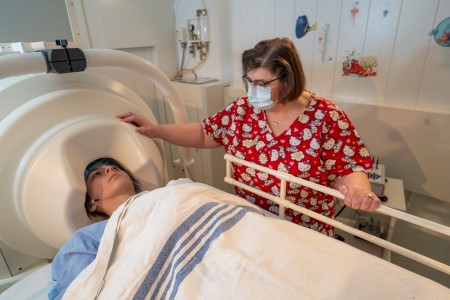
MEG
(Magnetoencephalography)
MEG (Magnetoencephalography) is a diagnostic machine that maps the magnetic fields created by the brain’s electrical activity. It is used to show the brain activity happening between seizures and other brain functions on top of a special MRI scan.
Procedures
- EEG/MEG mapping for cooperative patient (sleep deprived)
- EEG/MEG mapping for uncooperative patient (under general anaesthesia)
- Somatosensory Evoked Field Upper and Lower Limbs
Preparation
For epilepsy mapping, non-sedated patients must be sleep deprived (from 2 a.m. until arrival in MEG lab). If patients are taking medication for epilepsy, they should take them as they would normally. Make sure that your child has breakfast prior to thet test, unless instructed otherwise by the booking person.
All patients will be asked to change into hospital clothing for their MEG and MRI afterwards.
The MEG booking person will email you directly with specific instructions for your child, including arrival time, feeding instructions and other necessary information.

- Do not apply any hair styling products such as gel, hairspray, etc.
- Do not apply any makeup, particularly eye mascara, eyeliner and eye shadow.
- Do not apply any moisturizers or lotions on the skin or hair.
- Make sure to have your hair washed and dried on the day of or day before the test.
-
Make sure that your child has breakfast prior to the test.
Metallic devices
The magnetic fields that the MEG measures are very small, and can be easily distorted by metal objects. Any patient who has implanted metal objects (pacemaker, cochlear implant, metal plates) or metallic dental work—braces, metal caps, retaining wires—cannot have an MEG.
If your child has any metallic devices that are not removable, please contact the lab so we can arrange a test session.
What to expect
All patients will be asked to change into hospital clothing for their MEG and MRI afterwards.
Your child will need to lie still for at least 90 minutes. If the MEG is being performed for epilepsy, EEG electrodes and MEG localizing coils will also be applied to the child’s head. The MEG machine does not make any noise while collecting data but is within a special (magnetically shielded) room.
Requisitions
Requests will only be accepted from Paediatric Neurologists or Neurosurgeons. Referrals can be made through EPIC and must include the following information:
- Indication
- Seizure history
- EEG and EMU findings/results
- MRI results
- Completed MRI Screening form
- Cooperation level
If patient is unable to lay still for more than 90 minutes, general anaesthesia will be required. If a contrast enhanced MRI or a clinical MRI test is needed, a separate MRI requisition must be sent.
Outpatient and walk-in appointments
There are no outpatient appointments or walk-ins on evening or weekends or statutory holidays. Emergency and inpatient service only, no on-call hours.
- Tuesday to Thursday, 8:30 a.m. to 1 p.m (by appointment only)
- Referrals accepted only through Neurology (epilepsy service) or Neurosurgery.

